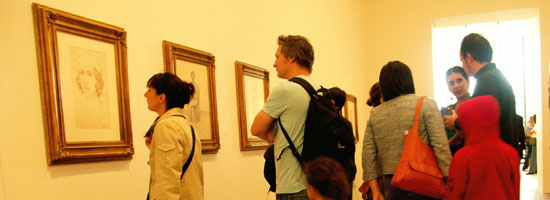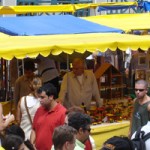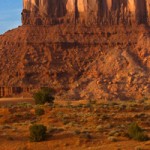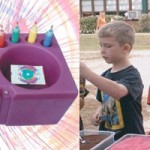Host a Solo Art Show or Booth

If you are an artist, at some point in time you will probably want to put your work on display. You can sell your work online or place your work in galleries. Another possibility is to host your own art show or have a artist’s booth at an event.
The first thing to consider is where you want to hold the show. Perhaps the simplest solution is to rent a gallery since they are already set up to hold artwork. If you are a painter, photographer, or other artist working in 2-D media, you can hang your work on the walls and be done with it. Sculptors will probably need pedestals for their work which the gallery may or may not provide.
If you are getting a booth at an event or hanging your work in a venue which does not ordinarily host art shows, you may have to get more creative with your display solutions. If the work is being shown outdoors, you will probably want to tent your display to avoid having your work get damaged by the elements. For outdoor events, pick a tent with removable fabric walls to provide additional protection for your work in case of inclement weather or wind.
Wherever you display your work, you can use traditional easels to display paintings and other 2-D creations or you can get creative and build modified easels to show multiple works in one space. For a more professional look, you can purchase, build, or rent display panels to hang your work. Sculptures can be displayed on pedestals regardless of the venue and shelves and tables can also be used. Just be sure the artwork is displayed in an attractive matter since the visual appeal is what will sell the work.
In an ideal world, patrons would just show up to an opening, however, publicity is generally necessary to get people to come to any event. If you are hanging your work at a well publicized event, a lot of the advertising work is being done for you. Regardless it is still smart to notify any past clients and fans of your work. If you have a Facebook page, a Yahoo group, or an email list, make use of them to publicize your event. For a more personal touch, you can also send written invitations, fliers, or post cards in the mail. A magazine or newspaper ad may be a good idea as well if the budget allows. While you can never promote any event too much, keep in mind the more you spend on an event, the higher your break even sales number will be.
On the day of the event, offering appetizers and beverages can be an additional draw. It is traditional for galleries to serve patrons wine at openings, but if the liquor laws prohibit serving wine at your event, consider sparkling cider instead. Keep in mind that with any food and beverages around artwork there is always the risk of an accidental spill.
Be sure to collect contact information from the people who come to your event. You can put out a guest book or have a raffle for a piece of art or other in demand item. Raffles tend to get more names and numbers because everyone wants something for nothing. It’s also a good idea to have business cards, fliers, or other take away promotional material so interested parties can contact you about work after the event.
If the event is a multi-day function, security may be a concern. If the facility is not secure enough to leave your work unsupervised, consider taking the art down at the end of each day and putting it up each morning. A locking trailer or a security fence may also be a solution. Regardless of the precautions you take, there is always the possibility that work may be damaged or stolen during a show. You might want to consider investing in show insurance for your work if it is particularly valuable.
The goal of most art shows is to either gain sales or commissions, but not every show will have immediate results. After your show ends, consider what was successful and what could be improved for the next show. Send a note to any contacts you garnered at the show thanking them for visiting and giving them your contact and web information. Be sure to add new contacts to your database of people to send studio updates and show invitations. Each show should build on the previous show to help garner sales, commissions, and publicity.







